
In case you wonder which Kindle book to read next while you travel, lay on a beach sipping a margarita, or get cozy in bed before sleep, then lucky for you, in this article, we’ll review the latest three books every business person should read to learn how to make smarter decisions, change habits, boost performance, and become a better version of themselves. Things you’re going to learn include but are not limited to: when to wake up, when to make better decisions, how to inspire others, when to get married, and so forth, things you’re not going to learn, however, are whom to marry and where. Okay, let’s get started.
When: The Scientific Secrets of Perfect Timing (2018) | Daniel H. Pink
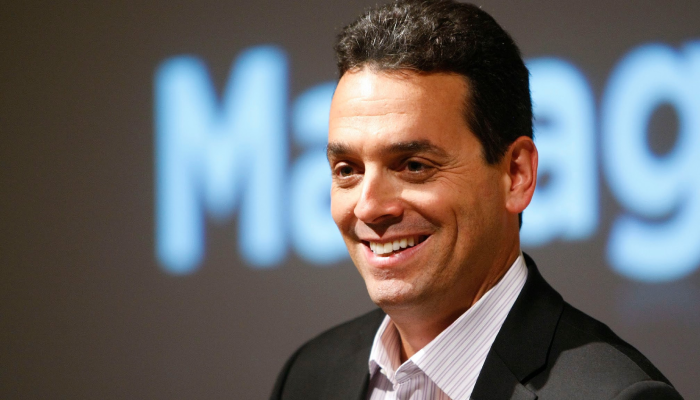
Daniel H. Pink is the author of six bestselling books, among which are A Whole New Mind: Why Right-Brainers Will Rule the Future, Drive: The Surprising Truth About What Motivates Us, To Sell Is Human: The Surprising Truth About Moving Others and his latest masterpiece, which we will cover in a moment, When: The Scientific Secrets of Perfect Timing. If you have not yet noticed, Daniel names his books provocatively and controversially, and, surprisingly, the contents of those books are just as provocative as their titles. To give you a little bit of background on the author, it’s worth mentioning that from 1995 to 1997, Pink was the chief speechwriter for Vice President Al Gore. He was also a host and co-executive of the 2014 social science TV series, Crowd Control, which was streamed on the National Geographic Channel.
Now, let’s delve into the depths of the book itself. For the simplicity of it, let’s just settle for the name When. When is about timing, which people, unfortunately, never pay much attention to — all our decisions most of the time are based on pure guesswork and intuition. But should it really be this way? Daniel H. Pink scoured the treasure troves of psychology, anthropology, biology, and even anesthesiology to find out how it’s best to approach the timing questions, like ‘when it’s time to get serious about a person’, ‘how we can turn a rough beginning into a fresh start’, ‘what time is ideal for quitting a job or getting married’, and so on.
So, there are three parts to the book. The first one is about the patterns of everyday life; the second one is about beginning, midpoints, and endings; and the last, third part is about synching and thinking. Each chapter covers a lot of science, but it’s not just a study book, but — a practical book as well. At the end of each chapter, there’s a “Time Hacker’s Handbook,” a collection of tools and resources to help you get started and apply your new knowledge.
The book opens up with a story of a shipwreck that happened just three years after Titanic, killing nearly 1200 people: Lusitania, the ship, perished under the German attack at the beginning of World War I, but not only because of the inevitability of the attack itself, which is still debatable, but also because of the bad decisions the captain made, although he was considered one of the best captains of his time. Why it happened and what made him make those decisions are still pretty much a mystery. Daniel H. Pink here argues, that timing is not an art, but rather – a science, by studying the principles of which one can make better decisions or at least avoid making bad ones.
Perhaps, you’d be surprised but two Cornell University sociologists analyzed 500 million tweets from more than two million users and evaluated each word for the emotion it conveyed and timing when the tweets were posted. Unsurprisingly enough, the most engaging and hopeful tweets happened in the mornings, plummeted in the afternoons, and rose back again by the evening. What the experiment confirmed was that humans have biological clocks, just like everyone else on planet Earth, from a single-cell to multicellular organisms. The biological timer is the suprachiasmatic nucleus in the hypothalamus, which runs a bit longer than the Earth’s full rotation, namely twenty-four hours and eleven minutes. Although the patterns differ from person to person, the aesthetics and principles of the process are very much the same. Pink then makes further examples of studies performed to confirm the diurnal rhythms that influence anything from corporate communications to daily decision-making practices of ordinary people. So above all those findings are very important takeaways: do everything important, including coming up with influential decisions, earlier in the day; avoid making any plans or judgments in the afternoon; schedule insight problems (that doesn’t require analytical skills but the creation and innovation) for the evenings.
Perhaps, you’re thinking that not all people are like that, some are night owls, they tend to be more productive during the later hours of the day, rather than in the beginning. And you’re right. For night owls, there’s a reverse order: recovery, trough, and peak. Even then, the afternoons are still bad for everything. Here’s a detailed chart if you really want to find out when to make the right decisions depending on your lifestyle:
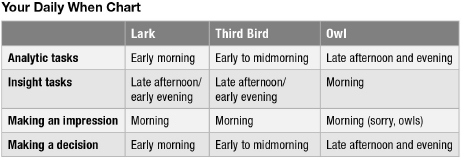
But what if you have to make important decisions or procedures in the afternoon? There’s a solution for you, Pink argues, called “vigilance breaks,” during which you stop doing what you’re doing and ask yourself a list of questions and check your progress or confirm your sanity if need be. You review the work done and check it against errors, cognitive bias, skim through instructions if there are any, and guard yourself against errors. Make these breaks at regular intervals during the afternoon session to improve the quality of your work and decisions. Also, the afternoons are best-taken care of lightly, meaning that if you can take a break and go outside, then this must also work as a restorative action against bad judgment.
Surprisingly, Pink says there’s no scientific evidence suggesting breakfasts are the best meals of the day; on the contrary, afternoons are best for food, preferably away from your desk. There are two ingredients to any powerful lunch: autonomy and detachment. Autonomy means that you have all the control of what you do and how you do it during your lunch break; detachment means that you are both physically and psychologically aloof from your work or daily distractions like social media.
Naps are another great source for recovery. However, if after a nap, you feel woozy and wobbly, then perhaps you’re doing it wrong. The ideal nap, according to Pink and studies he read, is between ten and twenty minutes.
As for the new beginnings, forget the cliche “New Year, New You,” because, let’s be honest, it never works. Instead, what you can do is to imbue a regular day with the power of a fresh start. Instead of saying that you intend to turn vegan on January 1, try another date, like January 8. Also, since human behavior is much more complex than we think, it’s best to establish temporal landmarks and check your progress against those. And if you see that you’re failing miserably, then start all over from that same landmark. If you can find a friend who can support you and start afresh with you, then it’s even better.
In case you’re buying a book to find out advice on marriage, then here’s a spoiler for you: get married between the ages of 25 and 32, wait until you complete your education, and date at least three years before committing yourself. Makes perfect sense.
Perhaps, you’re well aware of the fact, that people tend to slow down, get depressed, or abandon their dreams altogether when they’re halfway through. Here’s what you can do to reawaken your motivation during a midpoint slump: break large projects into smaller interim steps, so there won’t be essentially such a thing as midpoint per se; publicly commit to those interim goals (even a Facebook post will do here); stop a project partway with a clear next step, it might help fuel your day to day motivation, because the next time you’re at it, you’ll know exactly what and how to finish it; do the steps every day (if you’re writing, write every single day); dedicate your work to someone who can benefit from it.
Since endings are crucial in every situation, consider ending your day by reflecting what you have accomplished and writing down what you’ve achieved for that particular day. This shall not take more than three minutes. Plan for the next day for the following three minutes. And spend another minute on sending a ‘thank you’ note to someone who has helped you during the day.
One last final advice from the book, before we hop on to the next one, is coordinating with other people: sing in a chorus, run together, row a crew, dance, join a yoga class, participate in a flash mob, cook in tandem, or do anything else that would require synchronization and coordination with others, because activities such as these are scientifically proven to deliver uplift and boost your performance and emotional wellbeing.
The Execution Factor: The One Skill that Drives Success (2018) | Kim Perell

Kim Perell is a successful American businesswoman, executive, speaker, author, mentor, angel investor, and entrepreneur. She is perhaps most famous for her leadership at Amobee, a global marketing technology company with offices around the globe. She was sacked from one of the internet startups when she was only 23, but that didn’t discourage her from becoming a multi-millionaire by the age of 30: she sold her own company for 235 million dollars. Perell truly believes that her success was due to her ability to execute. The Execution Factor is exactly about that. Let’s get going.
The book is organized into five chapters the names of which correspond to a certain trait that Perell believes is critical to the success of a business executive. We’re talking about vision, passion, action, resilience, and relationships.
Kim was heavily influenced by her parents, who were renowned entrepreneurs, although from very different entrepreneurial backgrounds and paths. Both her parents had rough experiences in business, like bankruptcy for example, and yet none of them ever stopped believing in entrepreneurship and success. So Kim was raised in an entrepreneurial culture where such things as tenacity, analytical mindset, and vision were a given. However, despite her parent’s advice, she didn’t just settle for stability, she persevered by her parent’s examples, and lived through dismissals, rejections, disillusionment, and failure. What she thinks has separated her (and continues to separate) from other similar business people is the ability to act upon her dreams. Kim argues that a dream will always be a dream until you execute it. Execution is, therefore, the ability to do and get results. Well, if that sounds like another cliche, then because it’s probably is. But, Perell argues, the truth universally acknowledged is useless until you master it, so it becomes your second skin.
So, now, let’s get to the traits.
Vision. You should know where you’re going. You cannot allow your life to pass by default: you need to see not only where you are going but also what you’re doing with your life. You must make sure that your vision is truly YOURS, it’s something that belongs to you and what you really wish to accomplish. Visualize your goal, visualize executing it, and most importantly, visualize as though you’ve already accomplished it. How would you feel if you’ve made your dream come true? How would your life change? How would your perception of reality change if you accomplished what you want? Write your vision down, set yourself checkpoints, goals, prioritize and reprioritize your actions to serve your vision.
Passion. Love what you do to the extent that you are willing to suffer for it. Accept difficulties, challenges as your best friends, because without them there’s no true success. Passion also means that you’re truly connected to your vision; the emotional connection drives a lot of other things, like self-belief, positivity, learning, focus, satisfaction, and, of course, motivation to move forward. Now, for a moment, picture a passionate person. How would you describe them? Are they resilient? Are they enthusiastic about what they do? Are you jealous of their devotion and eagerness and energy? I bet you do because the passion is contagious and Perell really wants you to become that infectious person: imbue other people with your powerful passion. And if you succeed doing that, you’re on the right track. However, be careful, because a strong emotional connection to your goals can be misinterpreted as irrational. But whenever someone says you’re illogical, ignore those people, because we know you can do it and others cannot.
Action. Action is so powerful that it reminds you to check your vision and fulfill your passion. There’s also no substitute for taking action. Because the action is everything: if you do not act on your vision and passion, then both of them are pretty much useless. Moreover, do not let the bias of fear and doubt hold you back and stop you from taking those necessary steps — beware of them and learn how to put fears in perspective and act anyway. Manage your emotions, develop the traits of resilience, create relationships that foster your progression rather than hinder it.
Resilience. Accept that failure and setbacks are natural and inevitable parts of life and business. What matters is how you react to those failures and how you act upon them. The crucial part here is to learn to manage your emotions: find positives in every situation and build your resilience accordingly. Create a growth mindset where innovation and creativity thrives; teach everyone around you (like in your team) to do the same.
Relationships. No one will ever be in their places today (including you) if not for the people. You must understand the power of relationships and leverage your network. Create a culture where everyone has a voice and is not afraid of sharing their ideas and emotions, the culture of fear and disrespect will never get you that far. Learn how to foster and maintain relationships with others, attend seminars, workshops, share your success and learn from others.
In conclusion, always define your success as a number of lives you can truly influence.
The 5 AM Club: Own Your Morning, Elevate Your Life (2018) | Robin Sharma
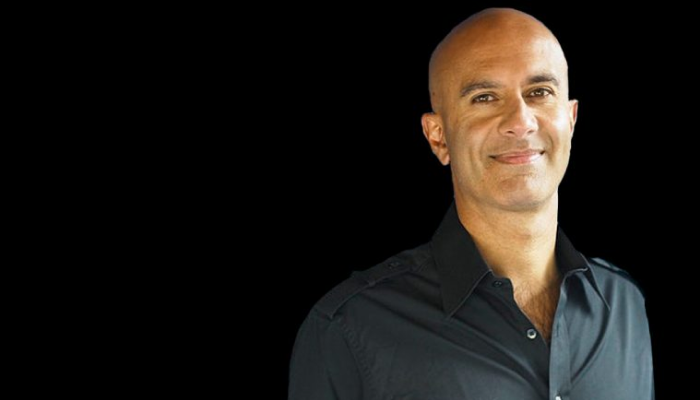
Okay, everyone knows Robin Sharma, right? I remember living in the heart of China back in 2014 and my friend handing me that famous book, The Monk Who Sold His Ferrari. China is perhaps the best place to dive into such a book, full of prophetic wisdom, powerful insights, and fascinating yet a little obvious morale. Now, Robin Sharma is an acclaimed speaker and mentor on leadership and personal mastery. For years, major corporations, from Nike to Yale to PwC chose Robin to be their mentor. Besides, Sharma has been ranked as one of the best leadership gurus of our time and has appeared along with such luminaries as Richard Branson, Jack Welch, and even Bill Clinton.
The 5 AM Club is based on the concept and method which Sharma has been teaching to many celebrated entrepreneurs and CEOs of legendary companies.
The book is structured around a fable about unnamed business people meeting and learning from a homeless man. Sharma argues that all life miseries can be easily cured by changing your morning routine. Yes, you read that right. He then writes that “the wisest way to guarantee that you consistently produce mastery-level results in the most important areas of your professional and personal life is to install a world-class morning routine.” The thesis of the book is, therefore, pretty straightforward: “own your morning, elevate your life.”
First, Sharma says, start by envisioning yourself as an imaginationalist – one who leads by the expectation of the future rather than by the confining events from the past. In order to achieve gargantuan results you’ve set up for yourself, you need to change your habits, calibrate, and automate them. Don’t believe that you have to win a DNA lottery to be one of those successful and celebrated entrepreneurs; most of those people have earned the results of their victories by achieving astronomical focus on their skills, learning to sacrifice, and be patient. So if you find yourself quite an ordinary fellow, you can achieve extraordinary feats by changing the way you do things and by routinizing the right habits. Also, if you think it’s too late to start afresh, then you’re wrong: never deplete the grand and electrifying possibilities that might lay ahead for you. You have to imagine every day as the day when you can lead and commit yourself to mastery over all things you do: refuse to allow negativity and distraction to hijack your sense of reality and infest your life with mediocrity. Find the work you love, and never do your job because of money. Be a virtuoso, an exceptionalist. Don’t be concerned about fame and cash, both of which doesn’t guarantee happiness and satisfaction. Play above the pay grade, surround yourself with talent, create and foster productivity, and inspire others. You can achieve all those things, which might sound impossible at first, by joining what Sharma calls The 5 AM Club. The power within you, according to Sharma, reveals itself with the first days of daybreak.
There are a few other rules to account for: break your addiction to distraction, instead rise up early and dedicate that extra hour to becoming a better person; don’t succumb for excuses — if you’ve never tried waking up early, then it doesn’t mean you can’t, you just haven’t tried it yet; accept that change is hard, but with consistent practice it will become automatic; don’t care for labels — if someone calls you a freak, you might be on a path for greatness; and finally, when you feel like giving up — persevere, because triumph loves relentless.
Sharma also brings attention to the learning model, “The Four Focuses of History-Makers:”
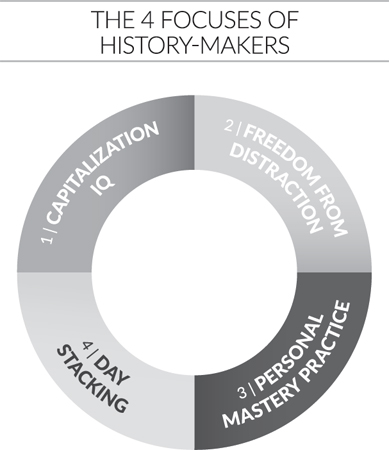
The first focus is Capitalization IQ: doesn’t matter with how much talent you’re born with — what matters is how much of your potential you truly actualize. Exceptional dedication, commitment, and drive is what separates overachievers from underachievers. By getting up early in the morning, you can cultivate your highest assets and prepare yourself for the day ahead.
The second focus is Freedom from Distraction. Let’s be honest here: social media is a serious problem in our culture that constantly erodes our potential and interferes with our interactions with others. Do not let your precious concentration become hijacked by the foolish use of technology and by no means occupy your extra hour in the morning with meaningless moves and zero-value activities. Start managing your focus, simplify your life, become a purist, concentrate on a few things that will truly add value to your life, rather than on many things that won’t bring anything new to you. Accept fewer invitations, don’t spend much time in useless leisure activities, instead — study and master your craft.
The third focus is Personal Mastery Practice. Train the best part of you so that you sweat more in practice and bleed less during the battlefield. Ultimately, the triumph belongs to the one who has prepared the most. As a preeminent psychologist, Anders Ericsson of Florida State University, teaches: “a performer must invest at least two hours and forty-four minutes of daily improvement on their chosen skill for ten years” to become a true professional. By mastering your craft daily for at least 3 hours, you’re almost guaranteed to become a genius in your chosen field. The most profound and deep work you can do is to work on yourself, cultivate your inner arenas, which will serve as guiding posts in your transformation. And remember that creativity, prosperity, and your impact on the planet are really expressions of what’s going on inside you. If you never believe in yourself, in abundance that you truly deserve — your mastery will suffer and you’ll never achieve what you want. So start believing in yourself now.
Now, there’s a subsequent granular framework for Personal Mastery Practice which defines what areas you should master. The interior empires you should strive to improve are Mindset, Heartset, Healthset, and Soulset. These four stepping stones comprise an internal power that rests inside every human being. Polish all four of these interior arenas in the wee hours of the early morning: grow and deepen your relationship with nature, clear your vision, prepare yourself for a worldwide service, let your toxic and dark emotions get cleared out and gone from your life, accept the reality, and prepare yourself for success ahead.
The last focus is on Day Stacking. Since our life is built on single days, which are really just life miniatures, you have to own your day to live a splendid and meaningful life. The key component of elevating your life is regularity. Remember that part-time regularity delivers part-time results. So if you’re thinking you’ll wake up at 5 am on weekdays but sleep till late in the afternoon during your weekend, then maybe you have not grasped it yet: waking up early should become your second nature.
Robin Sharma also mentions five scientific truths behind excellent habits that will help you succeed in establishing a daily routine. The truth number one goes like this: exceptional willpower is not inborn, but a developed skill. Truth number two: Personal discipline is a muscle that can and should be trained. Truth number three: when muscles are tired, the willpower weakens, recover is, therefore, important. Truth four: establishing a routine takes time, but then it shall become automation. And finally, increasing self-control in one area of your life elevates self-control in other areas.
So, if you’re still here and you still wonder what and how much it takes to establish a world-class routine, then almost halfway through the book Sharma shares the following framework:
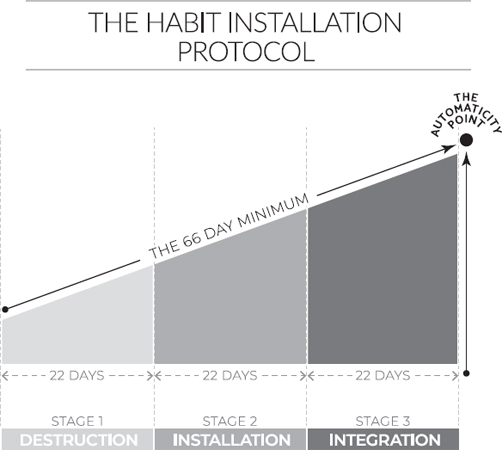
It will take you exactly 66 days to make your habit a reality, automation. Stick with your self-promise for at least 66 days, no matter what.
When you’re faced with a choice, always choose the one that’s going to push your limits, increase your growth, promote your performance, and foster your intellectual development. It might so happen that for the new you, your old self must die, so you could be reborn. But it’s all worth it. You’ll see for yourself.
If you’re wondering what to do with that extra allotted hour, here’s what Sharma has for you:
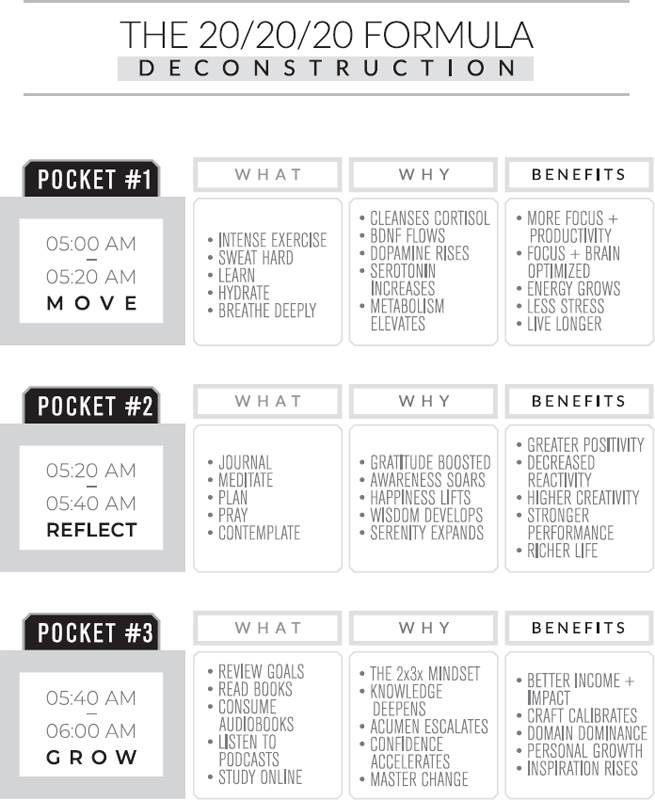
But the thing is … the work doesn’t just stop at that first hour of the early morning. What also plays a critical part is how you spend the last hour of your evening.
Here’s the deconstruction framework of an exemplary evening routine offered by Sharma:
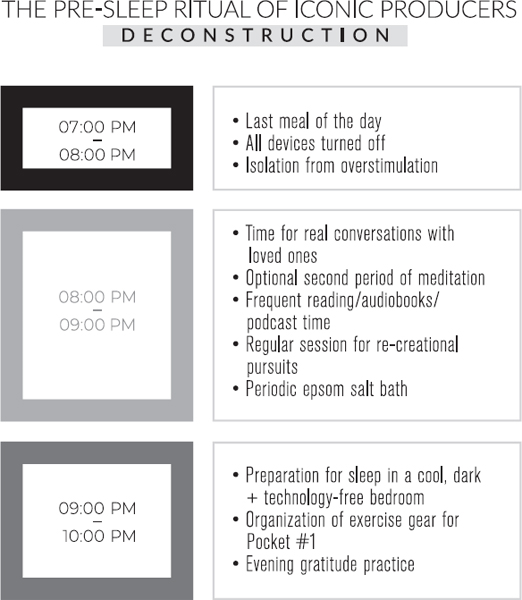
Actually, now that I’m writing this, I decided to wake up at 5 am tomorrow and try this in practice. Because let’s be honest, what’s the point of writing and reading if you’re never going to act upon the knowledge you’ve gained from both. So while I’m trying to do this for 66 days, I’ll document my journey, and who knows maybe I’ll share it sometime with you. Hopefully, that’s going to be a great adventure into my own psyche, I truly believe I’m going to learn a lot about myself. And while I am at it, I’ll say that I dedicate that extra hour to working out, reflecting and studying, something I have procrastinated for so long. I think that’s about time.
Read more:





